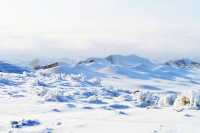Popular Trip Moments
8-Day Intensive Itinerary in Ili, Xinjiang|Independent Travel Guide | A Must-See Ultimate Guide for Autumn Trips in Changji Hui Autonomous Prefecture and Surrounding Areas | A roundup of those picture-perfect photos I've taken! | 10 Days in Northern Xinjiang, Average Cost 6k per Person | Legendary Self-Driving Route | The Year I Traveled the Duku Highway | Kuitun, a Unique Charm of the Northern Xinjiang Transportation Hub | 【4 Days 3 Nights Dreamy Ili Trip】2500 RMB Per Person Private Off-the-Beaten-Path Route & Photo Guide | Xinjiang Ili Custom | 8-Day Off-the-Beaten-Path Route, Taking You into a Fairy Tale World | Northern Xinjiang 8-Day Loop Itinerary | Xinjiang Self-Driving Tour, an Encounter with Stunning Scenery | November is legendary in Xinjiang! Snowy mountains and golden autumn-winter secret spots | 8-Day Tour of Changji Hui Autonomous Prefecture and Surrounding Areas: This Guide Is a Must-See | Five Days and Four Nights Exploring Xinjiang, 8000 RMB Per Person to See Snowy Mountains, Lakes, and Grasslands | Xinjiang is an addiction you can't quit: The ultimate travel guide | Snow-Dyed Canyon, a Warm Journey Home | Step into the world of Windows desktop wallpapers! | Kuitun, Xinjiang: An Underrated "Treasure City"! | The ultimate self-driving route in Western Sichuan! The full self-driving guide for Lixiaolu is here | 10-Day Northern Xinjiang Loop Guide|Explore the "Little Switzerland of China" for just 3k per person. | Golden Northern Xinjiang Eight-Day Journey | Xinjiang—A Must-Visit Paradise on Earth with a Super Complete Guide. | The duku highway | Although this wasn't taken with a camera, I still think it looks great, Xinjiang | Winter in Northern Xinjiang is truly not to be missed! | Stunning Yili🪻 | Kuqa Grand Canyon | Duku Highway | Duku Highway | Kanas + Ili + Duku Highway Essential Route
Recommended Attractions at Popular Destinations
Popular Attractions in Bangkok | Popular Attractions in Manila | Popular Attractions in Tokyo | Popular Attractions in Taipei | Popular Attractions in Hong Kong | Popular Attractions in Seoul | Popular Attractions in Kuala Lumpur | Popular Attractions in Los Angeles | Popular Attractions in Shanghai | Popular Attractions in New York | Popular Attractions in Shenzhen | Popular Attractions in Osaka | Popular Attractions in Singapore | Popular Attractions in London | Popular Attractions in Guangzhou | Popular Attractions in San Francisco | Popular Attractions in Beijing | Popular Attractions in Macau | Popular Attractions in Bali | Popular Attractions in Jakarta | Popular Attractions in Paris | Popular Attractions in Ho Chi Minh City | Popular Attractions in Istanbul | Popular Attractions in Phuket | Popular Attractions in Chicago | Popular Attractions in Seattle | Popular Attractions in Toronto | Popular Attractions in Orlando | Popular Attractions in Cebu | Popular Attractions in Chiang Mai
Popular Attractions
Mochou Lake Park | Yu Garden | Longhua Temple | Shanghai Jade Buddha Temple | Jingan Temple | Jichang Garden | Li Garden | The site of the first CPC National Congress | Former Residence of Zhou Enlai in Shanghai | Soong Ching-ling Memorial Park | Shanghai Wild Animal Park | Tai Hu Yuantouzhu Scenic Spot | Surging Waves Pavilion(Canglang Pavilion) | Oriental Pearl Radio & Television Tower | Bangchui Island | Nanwan Monkey Islet | Hailing Pearl Cultivation Farm | Portugese Settlement (Open Air Stage) | Wailingding Island | Qi Ao Island | Biblioteca comunale "Salvatore Boccia Montefusco" Poggiomarino (NA) | Jeelani Masjid Onnamile Thamarakulam | Pompey Club | Tms Art Gallery | Hősök Kapuja | Mitford Park | Danau Buatan | Maa Shelputri Devi Mata Mandir | AGR AQUATICS
Popular Restaurants in Kuytun
俭寨新疆菜大盘鸡·小公鸡烧烤·乌苏路店 | 俭寨大盘鸡新疆菜·小公鸡·烧烤(天北新区店) | 俭寨放牛记·新疆鲜牛肉火锅 | 食在艺厨新疆菜·民餐 | 俭朴寨新疆菜小公鸡·大盘鸡·烧烤(乌鲁木齐东路店) | 铁榆树丸子汤·新疆菜·烧烤(奎屯分店) | 王飞新疆菜·大盘鸡·烧烤(沙湾街店) | KUI TUN DA FENG HE SHENG TAI YUAN | 王飞大盘鸡·新疆菜·烧烤(奎屯店) | 俭寨小公鸡新疆菜·大盘鸡·烧烤(云通店) | 牛宫馆 | 宽窄巷子 | 艾力烧烤店 | 台湾苏氏牛排(团结东街店) | 尕妹特色拌面抓饭新疆菜 | 51号烤包子一把抓 | 阳派西饼(沙湾街店) | Baifukaoba (kuitunyouhao) | HUA ZAI SHAO KAO | 徐记沙湾大盘鸡·新疆菜烧烤 | Jingfu Beef | 火山汤海火锅城(豪丰国际店) | YI LI YANG ZA GUAN | LING YA BAO ZAI | 尔力架子肉·机器人餐厅(同济里社区店) | LUO LAN CHUN TIAN WEI SHANG GUAN | 渔公馆(大地中央广场店) | Dicos (beijinglu) | 阿不旦抓饭(大地中央广场店) | 饼司令·现熬粥·肉夹馍(团结路店)
Popular Ranked Lists
Popular Premium Hotels in Yangyang | Popular Premium Hotels in Shah Alam | Popular Premium Hotels in Sighnaghi | Popular Best Things to Do in Linxia Prefecture | Popular Premium Hotels in Ribandar | Top 50 Must-Visit Restaurants in Jinan | Top 50 Must-Visit Restaurants in Jiaxing | Top 10 Local Restaurants in Lushan Global Geopark | Popular Premium Hotels in Costa | Popular Best Things to Do in Vladivostok | Popular Premium Hotels in Sagres | Popular Best Things to Do in Yuncheng | Popular Best Things to Do in Linqu | Popular Premium Hotels in Arrowtown | Popular Premium Hotels in Yanque | Popular Premium Hotels in Bedford | Top 50 Must-Visit Restaurants in Zurich | Top 50 Must-Visit Restaurants in Leshan | Popular Premium Hotels in Altea | Popular Premium Hotels in Thu Dau Mot | Popular Premium Hotels in Shan | Top 50 Luxury Hotels near Klagenfurt | Top 50 Must-Visit Restaurants in Xichang | Popular Best Things to Do in Longyou | Popular Premium Hotels in Leeds | Top 50 Must-Visit Restaurants in Urumqi | Top 10 Best Things to Do in Huai'an | Popular Premium Hotels in West | Top 50 Best Things to Do in Mexico City | Top 50 Must-Visit Restaurants in Melaka
About
Payment methods
Our partners
Copyright © 2025 Trip.com Travel Singapore Pte. Ltd. All rights reserved
Site Operator: Trip.com Travel Singapore Pte. Ltd.
Site Operator: Trip.com Travel Singapore Pte. Ltd.























